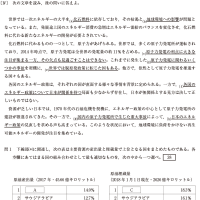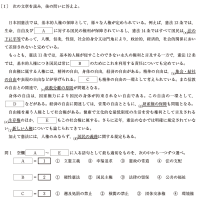・経済のグローバルについて、そのメリットとデメリットを述べ、グローバル化を推進すべきか、抑制すべきかを論述せよ。
経済のグローバル化とは、世界の市場が一体化し、国家間の貿易・投資・労働力の流れが自由化され、国境を超えたビジネスが活発に行われるようになった現象を指します。グローバル化のメリットとデメリットを以下に示し、最後にグローバル化を推進するべきか、抑制するべきかについて論述します。
メリット:
貿易の自由化により、世界的に競争が促進され、品質の向上や価格の低下がもたらされる。
外国企業の進出によって、現地企業に対する競争が高まり、技術や知識の流れが増加し、現地企業の能力向上につながる。
グローバル化によって、資本や労働力の流れが自由化され、それによって生産効率が上がる。
経済成長による貧困削減や生活水準の向上が期待される。
デメリット:
グローバル化によって国境を超えた移民が増えることで、社会問題が発生する可能性がある。
外国企業が進出することで、現地企業が打撃を受けることがある。
グローバル化によって、資源や環境の破壊が進む可能性がある。
貧富の格差が広がることがある。
グローバル化を推進するべきか、抑制するべきかは、その方法と程度によって異なります。グローバル化が適切に行われれば、メリットを最大限に引き出し、デメリットを最小限に抑えることができます。具体的には、グローバル化のメリットを享受しつつ、貧困や環境問題などの社会的課題に対処するための制度や政策が必要です。
また、グローバル化は、地域の特性や文化などに応じて、柔軟に対応する必要があります。一方で、グローバル化を完全に抑制することは現実的ではありません。経済のグローバル化を進めながら、社会的課題に対処することが重要です。たとえば、グローバル化によって格差が広がることがあるため、社会保障制度を整備し、格差を是正する必要があります。また、環境問題に対しては、国際的なルールや枠組みを設け、企業や国家が自主的に環境保護活動を行うよう促すことが必要です。
一方で、グローバル化を完全に抑制することは、国家間の貿易や投資の自由を制限することにつながり、その結果として世界経済が停滞することがあります。さらに、グローバル化は、企業や国家が国境を超えたコラボレーションを行うことで、技術や知識の共有が進むため、イノベーションを促進することができます。
したがって、経済のグローバル化は、そのメリットとデメリットを適切にバランスさせ、社会的課題に対処する政策や制度を整備することで、推進することが望ましいと考えられます。ただし、グローバル化によって生じる問題に対しては、国際的な協力が必要であり、国際機関や国際ルールの整備も必要不可欠です。
Economic globalization refers to the phenomenon of the integration of world markets, the liberalization of trade, investment and labor flows between nations, and the active conduct of cross-border business. The merits and demerits of globalization are shown below, and finally, whether globalization should be promoted or suppressed is discussed.
merit:
Trade liberalization promotes global competition, resulting in higher quality and lower prices.
The presence of foreign companies will increase competition with local companies, increase the flow of technology and knowledge, and improve the capabilities of local companies.
Globalization liberalizes the flow of capital and labor, thereby increasing production efficiency.
Economic growth is expected to reduce poverty and improve living standards.
Demerit:
As globalization increases the number of immigrants crossing national borders, social problems may arise.
The entry of foreign companies into the market may have a negative impact on local companies.
Globalization may accelerate the destruction of resources and the environment.
The gap between rich and poor can widen.
Whether globalization should be promoted or constrained depends on how and to what extent. Done well, globalization maximizes benefits and minimizes disadvantages. Specifically, we need systems and policies to deal with social issues such as poverty and environmental problems while enjoying the benefits of globalization.
In addition, globalization needs to be handled flexibly according to regional characteristics and culture. On the other hand, it is not realistic to curb globalization completely. It is important to address social issues while promoting economic globalization. For example, since globalization can widen disparities, it is necessary to improve social security systems and correct disparities. Also, regarding environmental issues, it is necessary to establish international rules and frameworks and encourage companies and nations to voluntarily carry out environmental protection activities.
On the other hand, completely curbing globalization would lead to restrictions on trade and investment freedom between nations, which could result in stagnation of the global economy. Furthermore, globalization can promote innovation by promoting the sharing of technology and knowledge through cross-border collaboration between companies and nations.
Therefore, it is desirable to promote economic globalization by appropriately balancing its merits and demerits and by developing policies and systems to deal with social issues. However, international cooperation is necessary for problems caused by globalization, and the development of international organizations and international rules is also essential.




















※コメント投稿者のブログIDはブログ作成者のみに通知されます